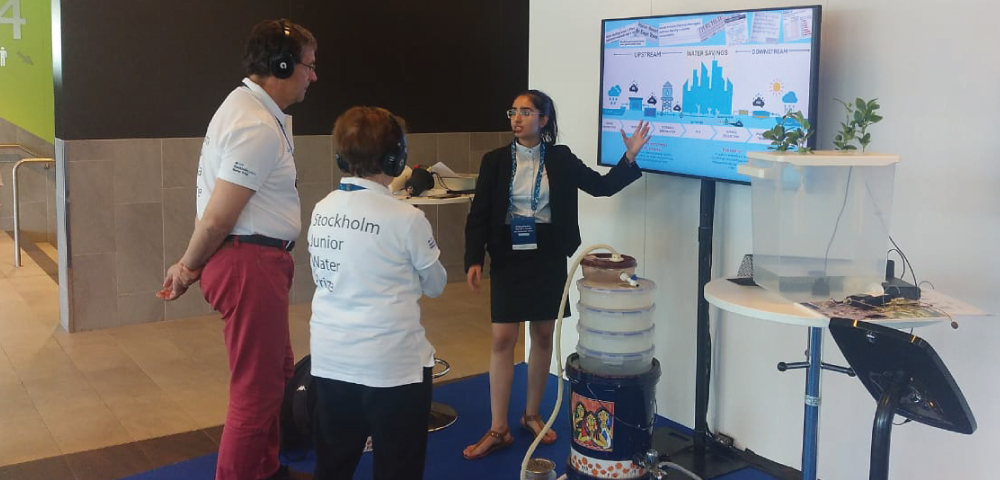From School to STEM: Leading more women to love the sciences
By lodha
January 10, 2025
Despite progress in education and workforce participation, Indian women remain underrepresented in STEM fields. Social expectations, limited mentorship, and workplace biases deter many talented women from pursuing or sustaining STEM careers. But the journey to overturn these numbers starts right from school. And girl students at the Lodha Genius Programme are leading this change.
Mannat Kaur, a Grade 12 student at DPS RK Puram, Delhi, has been named the national winner of the World Water Prize and awarded the title of ‘Jal Doot’ or ‘Water Ambassador of the Government of India.’ Her innovative project focuses on conserving and treating household greywater—relatively clean wastewater from washing, bathing, and some kitchen activities. Inspired by its promise and economic potential, Mannat is now working to bring this green technology to life, seeking guidance from technical and marketing experts to assess its feasibility.
Mannat’s journey exemplifies how a supportive school research ecosystem can inspire young, brilliant minds—especially girls—to think beyond textbooks and develop a passion for science. This encouragement could ultimately boost female representation in STEM fields. Mannat credits her father’s early support as a key influence, paired with exposure to the Atal Innovation Lab in her junior school, which nurtured her curiosity and logical thinking. She began experimenting with assembling and disassembling hardware and meters, earning the nickname “Soldering Iron Girl” among her peers. Recently, she expanded her skills to include Python and Machine Learning. However, her deep passion for environmental conservation became the driving force behind the four-year journey of her project.
For her greywater innovation, Mannat began with the premise that treating all used water (from household, sewage, cleaning, bathing, laundry) equally and centrally, filtering it, purifying it, and then repumping it back into households is a very energy and expense-intensive process. Whereas greywater, which is relatively clean, requires less effort to purify and can be localised to the household itself. This is where her technology comes in. Supported by her mentors, she created a design for a compact device that can be fitted in homes and would collect such greywater and then filter it.
Mannat recalls that the idea for her project took shape during her school years, coinciding with her selection for the Lodha Genius Programme—a fully funded, multi-year initiative supported by Lodha Foundation in partnership with Ashoka University. This programme nurtures India’s brightest young minds from Grade 9 through their early careers. Under the guidance of Aun Abdullah, Lodha Group’s head of sustainability, she engaged with environmental engineers and technicians from STP organizations. These interactions and field visits provided her with valuable real-world insights.
Her DIY spirit, combined with mentorship from the Lodha Genius Programme, enabled her to develop and test her first prototype at home. Buoyed by this success, Mannat entered national and international STEM competitions, where her innovative project earned her the Stockholm Junior Water Prize India (SJWP India)—India’s debut participation in the event. With technical support from IIT Madras professors, she refined her second prototype, which she later presented at the global level in Sweden. Mannat has since applied for a provisional patent for her innovation at the Indian Patent Office.
On the wide gap between the representation of girls and boys in STEM, Mannat says, “Girls don’t get into STEM or Robotics. They think it is a complicated journey. But I want to say, this is a fascinating field with ample opportunities to live your dream if your idea has the potential. There are many competitions where you can take your idea, there are mentors and help, funding and even seed funding to develop prototypes. First, it is you who has to know that your idea has potential and have the drive to go beyond school curriculum to research on your topic.” Mannat has already applied to several top ranked universities abroad and is hoping to take up computer science as a major while continuing her interdisciplinary learning of civil engineering, as well as nurturing her passion for sustainability, to see what could be next for her project, and her journey in STEM.
You may also like
Most common queries



 Enquire
Enquire
 Call
Call
 chat
chat
 Search
Search





